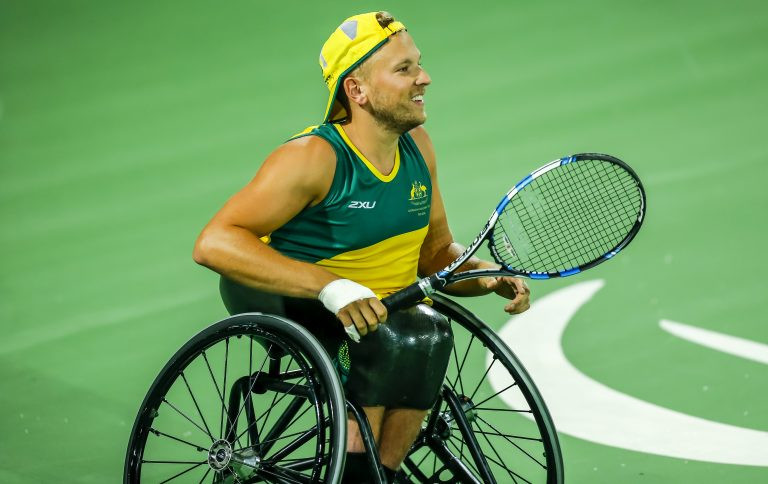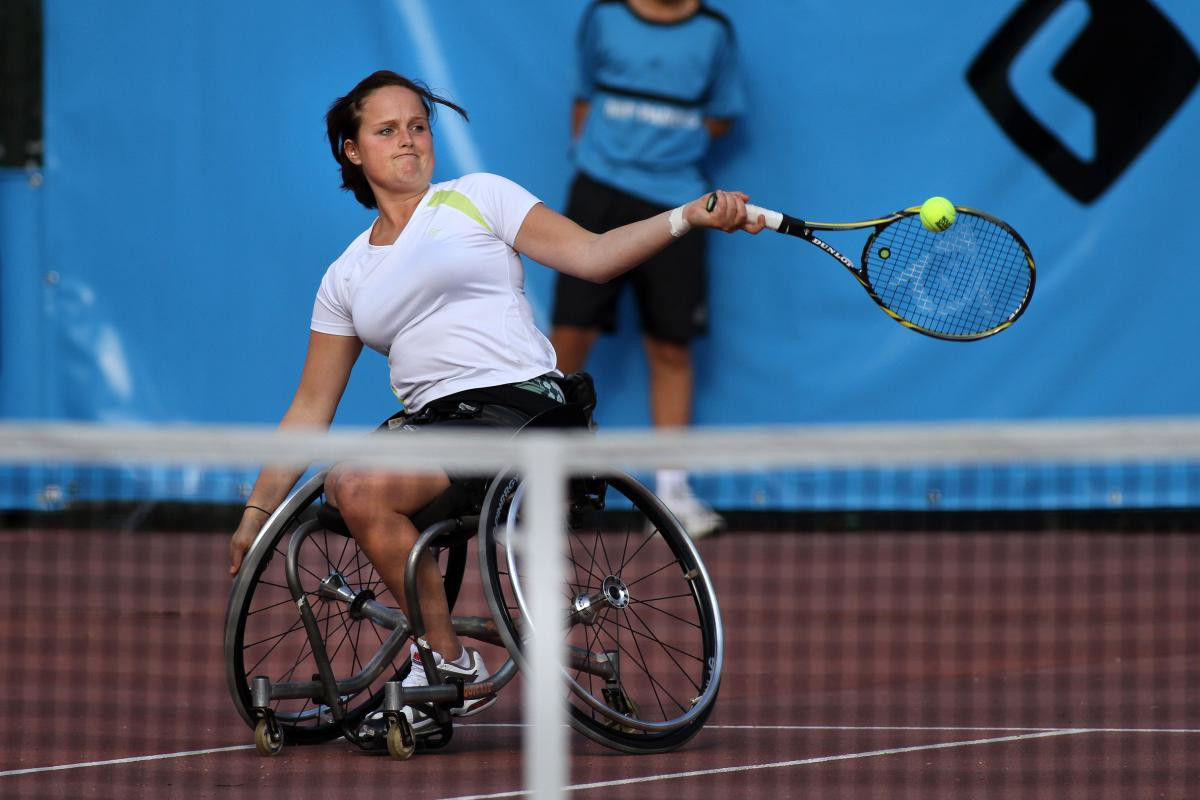A Dream Realized in Paris
For Tokito Oda, Paris is more than just a city; it's a place where dreams take flight. Named after the iconic Arc de Triomphe, Oda has achieved remarkable feats on the Parisian clay courts, winning two of his four wheelchair tennis Grand Slam titles at the French Open. He believes his Paralympic debut in the City of Lights is a testament to fate.
"This is a special place for me, and there’s no guarantee that there would be another Paralympics in Paris while I’m alive. I’ve been playing with a mindset that this is a once-in-a-lifetime opportunity for me to play at the Games in Paris," he said.
From Hospital Bed to Grand Slam Champion
Oda's journey to the Paralympics is a story of resilience and determination. At the tender age of nine, he was diagnosed with bone cancer and underwent treatment and surgery. During his hospital stay, a chance encounter with a video of Shingo Kunieda, a wheelchair tennis legend, playing in the men's singles final at the London 2012 Paralympic Games, sparked a flame in Oda's heart.
"I used to play soccer when I was young and I started using a wheelchair when I was six. That’s a really big thing as a kid, but I saw Para sport and then I got a dream. That was really important for me, for my life."
"When I was in the hospital, I watched a few sports – wheelchair tennis, basketball and something else. And I picked wheelchair tennis, because we have Shingo Kunieda from the same country," Oda said. "I watched a video of him play and I decided to play wheelchair tennis."
A Meteoric Rise to the Top
Since embracing wheelchair tennis, Oda's ascent has been nothing short of phenomenal. At just 14, he became the youngest ever boys' world No. 1 in the junior wheelchair tennis rankings. Three years later, he etched his name in the annals of tennis history by winning his maiden Grand Slam title at Roland Garros. He then became the youngest athlete to become world No. 1 in the wheelchair tennis singles rankings. Now, with three more Grand Slam titles under his belt, Oda is a household name in Japan.
"I really enjoy playing wheelchair tennis with a chair and a racquet. Normally (in tennis), we only have racquets when standing. Playing sports in a chair is really difficult but also it’s really fun," Oda said. "That’s what is the most important for me."
Paris: A City of Inspiration
Paris has a special significance for Oda beyond his sporting achievements. His name, Tokito, holds a deep connection to the city's iconic landmark.
"I have many lucky things here. My name is Tokito and my kanji (Japanese character) was taken from the Arc de Triomphe. So, I have inspiration from Paris. This time, it’s so special for me."
His unwavering belief in himself and his determination to make the most of this opportunity are evident in his words.
"I think my biggest supporter is myself because I’ve decided everything by myself. Also my parents are supportive, but I chose almost everything – to play in this sport and where to go. Everything I chose by myself, and I think that is very important to live my own life."
A Legacy of Inspiration
Just as Kunieda served as his role model, Oda is eager to pave the way for future generations of wheelchair tennis players. He hopes to inspire young athletes and make wheelchair tennis more accessible.
"To kids who have started playing wheelchair tennis, I want to share with them what I’ve experienced on the international stage. And to those who haven’t started, I want to open a door for them to become interested.
"For me, the Paralympic Games are one of my biggest chance to change my life and to change the lives of other people who are watching my match. Hopefully they will start playing tennis and wheelchair tennis also," Oda said.
"I want to show my tennis to many people."
The World's Best Compete in Paris
The 2024 Paralympic wheelchair tennis tournament has seen the world's top players take to the clay courts of Roland-Garros Stadium. The competition has been fierce, with Alfie Hewett, Tokito Oda, Martin De La Puente, and Gustavo Fernandez, the top four players, all advancing to the last 16.
Hewett, the world No. 1, made a strong start, defeating Sergei Lysov of Israel in straight sets. He's a player I didn't know,’ admits the 26-year-old Para athlete. He was a good opponent to get me into the swing of things.
In his first match, Oda faced a tough challenge from Ben Bartram of Great Britain, but he ultimately prevailed in a tight match. He played really well, it was great tennis,’ said the Japanese.
De La Puente, the world No. 3, proved unstoppable in his first match, losing just two games to Ezequiel Casco of Argentina. "It's a very special court because the people are so close to the players,’ enthused the Galician. With my family in the stands, I felt right at home."
Fernandez, the former world No. 1, was delighted to be back in Paris and at Stade Roland-Garros. "It's the best place in the world to play tennis,’ he said. The crowd was incredible and it was magnificent."
A Clash of Titans: Paralympics vs. US Open
The Paralympics wheelchair tennis tournament has created a unique situation, causing a clash with the US Open. For the first time in history, the US Open will not feature men's and women's wheelchair or quads tennis due to the Paralympic Games.
While the world's best wheelchair tennis players are competing in Paris, the junior wheelchair tournament is taking place at the US Open in New York.
This situation highlights the growing prominence of wheelchair tennis and its increasing recognition as a major sporting event.
A Global Stage for Israeli Talent
Four Israeli athletes are making their mark on the international stage at the Paralympic Games in Paris: Adam Berdichevsky, Guy Sasson, Sergei Lysov, and Maayan Zikri.
Berdichevsky, who took up wheelchair tennis after losing a leg in a boating accident in 2007, earned a first-round victory against Luca Arca of Italy. This was Berdichevsky’s first singles victory at the Paralympics after debuting at Tokyo 2020.
"I cannot say how much fun it was to represent my country like this. The win, it was the first time I played in front of a crowd like this, and it felt like I played at home – it was very special. I was very happy I could give some good times to people amid all the bad days."
Lysov, who was diagnosed with Perthes’ disease at age 9 and immigrated to Israel from Russia in 2019, had a strong Paralympic debut, defeating Brayan Tapia of Chile. He reached a career-high ranking of No. 17 earlier this month and advanced to the second round against the tournament’s No. 1 seed, Alfie Hewett of Great Britain.
Sasson, the Roland Garros quad singles champion, won his first-round match against Francisco Cayulef of Chile. “Playing for the first time in a great stadium like that, with so many fans who came to watch us… it was a great atmosphere and a unique feeling,” said Sasson. “I had a lot of fun playing this match."
Zikri, the only female on the Israeli team, defeated Najwa Awane of Morocco. “It means pride, joy, happiness, and excitement. I am so proud to represent the country that I love, our nation."
Wheelchair Tennis: A Sport for All
The Paralympic Wheelchair Tennis Event is a testament to the inclusivity and spirit of the Paralympic Games. With 95 players from 28 nations competing, it showcases the diversity and talent of wheelchair tennis players worldwide.
The tournament is played on outdoor clay courts, and the Stade Roland Garros boasts retractable roofs to protect players from inclement weather. It is a remarkable feat of engineering that allows for the seamless continuation of the tournament, regardless of the weather conditions.
Celebrating the Triumph of the Human Spirit
The Paralympic Wheelchair Tennis Event is more than just a sporting competition; it is a celebration of the human spirit. Athletes from all walks of life, overcoming adversity and defying limitations, come together to showcase their skills and inspire the world.
The stories of these athletes are truly remarkable. They are role models for people of all ages and abilities, demonstrating that anything is possible with passion, determination, and a belief in oneself. The Paralympic Games offer a platform for athletes to share their stories and inspire others to pursue their dreams, regardless of the challenges they may face.
A Bright Future for Wheelchair Tennis
The growing popularity of wheelchair tennis, both at the professional and grassroots levels, is a testament to the sport's appeal and its potential for growth. The Paralympics provide a global stage for the sport, showcasing the exceptional talent and dedication of wheelchair tennis players. With the increasing accessibility of the sport, it is poised to attract a new generation of athletes and continue to inspire people around the world.


















